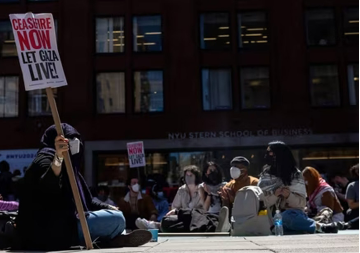With the Delhi Declaration, BRICS nations, which met recently in the Indian capital, have shown that they have the steel to stand up to traditional power structures, a cohesive vision to jointly respond to development challenges through institutionalisation of concrete mechanisms, and the determination to channel monetary power to strengthen markets, businesses and trade. The Declaration indeed gives insight into the gradual transformation of BRICS, from essentially a response mechanism crafted to address the various development challenges posed by the global financial crisis, to a forward looking entity seeking to enact and enable real global transformation.
The Delhi Declaration extends over 50 paragraphs which are all encompassing in some sense and address many relevant themes for BRICS countries and the developing world at large. The Declaration is significantly more impressive and comprehensive than the 16 paragraph Joint Statement of the BRICS Leaders at the first summit held at Yekaterinburg in 2009 and the sketchy and macro statement of purpose at Sanya last year. The Action Plan within the Delhi Declaration consists of 17 steps which will deepen intra-BRICS engagements. There are three prominent narratives that define the Delhi Declaration - reaffirmation of the UN framework for global governance, disappointment with financial regimes shaped in the mid 20th century and a confidence to tap into economic opportunities that exist within BRICS.
The Delhi Declaration has stamped the intent of BRICS nations to coordinate and collectively respond to global security challenges within appropriate frameworks that give precedence to fundamental principles such as international law, transparency and sovereignty. BRICS members have recognised and re-emphasised the centrality of the UN in dealing with regional tensions and they have explicitly outlined this for specific cases including the Arab-Israeli conflict, the Syrian imbroglio and the contentious Iranian nuclear programme.
The Declaration unambiguously states that "plurilateral initiatives" that go against the fundamental principles outlined earlier, will not be supported by BRICS. The Declaration is clearly against actions such as asymmetric trade protectionism, unilaterally imposed sanctions and taxes imposed on businesses. The EU’s Aviation Tax is one such example from contemporary policymaking. In terms of trade, there is strong emphasis on operating within legal instruments such as the WTO and institutions such as the UNCTAD for furthering the inclusive development efforts through consensus and technical cooperation.
The aftershocks from the financial crisis are still a cause of concern to the BRICS nations. The pre-occupation with Europe has distracted attention from the social transformation programmes and poverty alleviation efforts among BRICS members. The Delhi Declaration has spelt out the "immediate priority" of restoring market confidence and getting global growth back on track. The steps to address such concerns will include attempts to rebalance global savings and consumption, furthering of regulatory and supervisory oversight in the financial markets, increasing the voice of developing and emerging nations in global financial governance and the institutionalisation of financial mechanisms to redirect existing capital to tackle development imperatives.
The BRICS members have therefore announced a working group led by the Finance Ministers of the individual nations, in order to examine the "feasibility and viability" of a BRICS Development Bank. When formed, such an institution will likely be able to shift and contextualise the development discourse within and outside BRICS and therefore is one of the most significant actionable outcomes. It is evident that such a multilateral institution is not meant to compete with existing ones, but rather, to enhance lending and investment to create sustainable development trajectories. Contrary to expectations several high ranking Chinese policymakers, including the Assistant Foreign Minister, Ma Zhaoxu, have supported the idea.
The BRICS members have clearly outlined that the purpose and nature of Bretton Woods Institutions such as the World Bank, must shift from being essentially a mediation instrument to enable North-South cooperation, to one which can actually prioritise "development issues" and overcome the "donor-recipient dichotomy". They have also called upon the World Bank to mobilize greater directed resources and enable development financing at reduced costs through financial innovations and improved lending practices. Indeed for BRICS, the focus on World Bank and IMF reforms has remained constant through the years, yet the Delhi Declaration articulates these concerns more lucidly than ever before.
Given that intra-BRICS trade has been consistently on the rise over the past decade, BRICS Leaders have endorsed the conclusion of the Master Agreement on Extending Credit Facility in Local Currency under the BRICS Interbank Cooperation Mechanism and the Multilateral Letter of Credit Confirmation Facility Agreement between their respective EXIM/Development Banks. Such steps to mitigate market risks and enable local currency transactions will only add to the existing momentum and build resilience in BRICS economies to global business cycle fluctuations and exchange rate volatilities. Notably, BRICS have also endorsed the market led efforts to set up a BRICS Exchange Alliance between the major stock exchanges of BRICS, which will enable investors to efficiently allocate capital across BRICS economies and invest in the BRICS growth story.
The unity and purpose of BRICS has been the target of speculation and scepticism from various quarters. With the Delhi Declaration, BRICS members have been able to assuage such doubts as they have begun to create a credible hedge against traditional global narratives of security and development. They have simultaneously been able to project that there is resolution within the group to deal with issues that are not only of immediate concern but even those that will need attention in the future. The Delhi Declaration paves the way for the institutionalisation of BRICS cooperation, making BRICS a significant transcontinental and politically united force. In Sanya BRICS spread wide to include South Africa; in Delhi they went deep to include substance.
(Samir Saran is Vice-President and Vivan Sharan an Associate Fellow at Observer Research Foundation. The Foundation hosted the BRICS Academic Forum in March this year)
The views expressed above belong to the author(s). ORF research and analyses now available on Telegram! Click here to access our curated content — blogs, longforms and interviews.




 PREV
PREV

